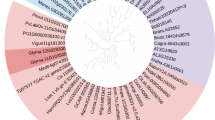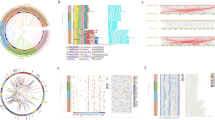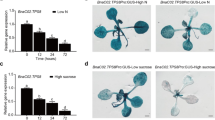Abstract
Key message
Os4BGlu14, a monolignol β-glucosidase, plays a negative role in seed longevity by affecting primary metabolism during seed development and aging.
Abstract
Seed longevity is a crucial trait in agriculture and in the conservation of germplasm resources. β-Glucosidases (BGlus) are multifunctional enzymes that affect plant growth and their adaptation to the environment. The function of rice BGlus in seed longevity, however, remains unknown. We report here that Os4BGlu14, a rice β-Glucosidase, negatively affected seed longevity during accelerated aging. Os4BGlu14 was highly expressed in rice embryos and induced by accelerated aging. Compared to the wild type, rice lines overexpressing Os4BGlu14 had significantly greater grain length, but smaller grain width and thickness. Overexpressing (OE) lines also showed lower starch but higher glucose contents. After accelerated aging treatment, OE lines displayed a significantly lower germination percentage than the wild type. Additionally, these lines had higher lignin accumulation before and after accelerated aging. Metabolome analysis detected 217 metabolites in untreated and aged rice seeds. Comparison of the differential metabolites between WT and OE5 revealed that ten key metabolites, four of which (e.g., uridine 5′-diphosphoglucose-glucose, UDPG) were increased, while the other six (e.g., γ-aminobutyric acid and methionine) were decreased, might be the crucial factors that lead to seed deterioration. Further analysis confirmed higher UDPG levels and more severe programmed cell death in OE lines than in the wild type. Furthermore, OE lines presented a lower germination rate after abscisic acid and paclobutrazol treatment during germination, compared to the wild type. Our study provides a basis for understanding the function of Os4BGlu14 in seed longevity in rice.







Similar content being viewed by others

References
Amir R, Galili G, Cohen H (2018) The metabolic roles of free amino acids during seed development. Plant Sci 275:11–18. https://doi.org/10.1016/j.plantsci.2018.06.011
Angelovici R, Fait A, Zhu X, Szymanski J, Feldmesser E, Fernie AR, Galili G (2009) Deciphering transcriptional and metabolic networks associated with lysine metabolism during Arabidopsis seed development. Plant Physiol 151(4):2058–2072. https://doi.org/10.1104/pp.109.145631
Bailly C (2004) Active oxygen species and antioxidants in seed biology. Seed Sci Res 14:93–107. https://doi.org/10.1079/SSR2004159
Baiya S, Hua Y, Ekkhara W, Ketudat Cairns JR (2014) Expression and enzymatic properties of rice (Oryza sativa L.) monolignol β-glucosidases. Plant Sci 227:101–109. https://doi.org/10.1016/j.plantsci.2014.07.009
Baiya S, Mahong B, Lee SK, Jeon JS, Ketudat Cairns JR (2018) Demonstration of monolignol β-glucosidase activity of rice Os4BGlu14, Os4BGlu16 and Os4BGlu18 in Arabidopsis thaliana bglu45 mutant. Plant Physiol Biochem 127:223–230. https://doi.org/10.1016/j.plaphy.2018.03.026
Bernal-Lugo I, Leopold AC (1992) Changes in soluble carbohydrates during seed storage. Plant Physiol 98(3):1207–1210. https://doi.org/10.1104/pp.98.3.1207
Bueso E, Muñoz-Bertomeu J, Campos F, Brunaud V, Martínez L, Sayas E, Ballester P, Yenush L, Serrano R (2014) ARABIDOPSIS THALIANA HOMEOBOX25 uncovers a role for Gibberellins in seed longevity. Plant Physiol 164(2):999–1010. https://doi.org/10.1104/pp.113.232223
Buitink J, Leprince O (2004) Glass formation in plant anhydrobiotes: survival in the dry state. Cryobiology 48(3):215–228. https://doi.org/10.1016/j.cryobiol.2004.02.011
Châtelain E, Satour P, Laugier E, Ly VuB, Payet N, Rey P, Montrichard F (2013) Evidence for participation of the methionine sulfoxide reductase repair system in plant seed longevity. Proc Natl Acad Sci USA 110(9):3633–3638. https://doi.org/10.1073/pnas.1220589110
Chen C, Letnik I, Hacham Y, Dobrev P, Ben-Daniel BH, Vanková R, Amir R, Miller G (2014) ASCORBATE PEROXIDASE6 protects Arabidopsis desiccating and germinating seeds from stress and mediates cross talk between reactive oxygen species, abscisic acid, and auxin. Plant Physiol 166(1):370–383. https://doi.org/10.1104/pp.114.245324
Chen D, Li Y, Fang T, Shi X, Chen X (2016) Specific roles of tocopherols and tocotrienols in seed longevity and germination tolerance to abiotic stress in transgenic rice. Plant Sci 244:31–39. https://doi.org/10.1016/j.plantsci.2015.12.005
Chen X, Wang H, Li X, Ma K, Zhan Y, Zeng F (2019) Molecular cloning and functional analysis of 4-Coumarate:CoA ligase 4 (4CL-like 1) from Fraxinus mandshurica and its role in abiotic stress tolerance and cell wall synthesis. BMC Plant Biol 19(1):231. https://doi.org/10.1186/s12870-019-1812-0
Cheng B, Li Z, Liang L, Cao Y, Zeng W, Zhang X, Ma X, Huang L, Nie G, Liu W, Peng Y (2018) The γ-Aminobutyric acid (GABA) alleviates salt stress damage during seeds germination of white clover associated with Na+/K+ transportation, dehydrins accumulation, and stress-related genes expression in white clover. Int J Mol Sci 19(9):e2520. https://doi.org/10.3390/ijms19092520
Christopher JVRH, Wim VDE (2018) UDP-glucose: a potential signaling molecule in plants? Front Plant Sci 8:2230. https://doi.org/10.3389/fpls.2017.02230
Clerkx EJM, Vries BD, Ruys GJ, Groot SPC, Koornneef M (2004) Genetic differences in seed longevity of various Arabidopsis mutants. Physiol Plantarum 121(3):448–461. https://doi.org/10.1111/j.0031-9317.2004.00339.x
Cohen H, Pajak A, Pandurangan S, Amir R, Marsolais F (2016) Higher endogenous methionine in transgenic Arabidopsis seeds affects the composition of storage proteins and lipids. Amino Acids 48:1413–1422. https://doi.org/10.1007/s00726-016-2193-4
Debeaujon I, Léonkloosterziel KM, Koornneef M (2000) Influence of the testa on seed dormancy, germination, and longevity in Arabidopsis. Plant Physiol 122:403–414. https://doi.org/10.1104/pp.122.2.403
Escamilla-Treviño LL, Chen W, Card ML, Shih MC, Cheng CL, Poulton JE (2006) Arabidopsis thaliana beta-Glucosidases BGLU45 and BGLU46 hydrolyse monolignol glucosides. Phytochemistry 67(15):1651–1660. https://doi.org/10.1016/j.phytochem.2006.05.022
Fait A, Nesi AN, Angelovici R, Lehmann M, Pham PA, Song L, Haslam RP, Napier JA, Galili G, Fernie AR (2011) Targeted enhancement of glutamate-to-gamma-aminobutyrate conversion in Arabidopsis seeds affects carbon-nitrogen balance and storage reserves in a development-dependent manner. Plant Physiol 157(3):1026–1042. https://doi.org/10.1104/pp.111.179986
Fu Y, Gu Q, Dong Q, Zhang Z, Lin C, Hu W, Pan R, Guan Y, Hu J (2019) Spermidine enhances heat tolerance of rice seeds by modulating endogenous starch and polyamine metabolism. Molecules 24(7):E1395. https://doi.org/10.3390/molecules24071395
Gao J, Fu H, Zhou X, Chen Z, Luo Y, Cui B, Chen G, Liu J (2016) Comparative proteomic analysis of seed embryo proteins associated with seed storability in rice (Oryza sativa L.) during natural aging. Plant Physiol Biochem 103:31–44. https://doi.org/10.1016/j.plaphy.2016.02.026
Hua Y, Sansenya S, Saetang C, Wakuta S, Ketudat Cairns JR (2013) Enzymatic and structural characterization of hydrolysis of gibberellin A4 glucosyl ester by a rice β-D-glucosidase. Arch Biochem Biophys 537(1):39–48. https://doi.org/10.1016/j.abb.2013.06.005
Hua Y, Ekkhara W, Sansenya S, Srisomsap C, Roytrakul S, Saburi W, Takeda R, Matsuura H, Mori H, Ketudat Cairns JR (2015) Identification of rice Os4BGlu13 as a β-glucosidase which hydrolyzes gibberellin A4 1-O-β-d-glucosyl ester, in addition to tuberonic acid glucoside and salicylic acid derivative glucosides. Arch Biochem Biophys 583:36–46. https://doi.org/10.1016/j.abb.2015.07.021
Ketudat Cairns JR, Esen A (2010) β-Glucosidases. Cell Mol Life Sci 67(20):3389–3405. https://doi.org/10.1007/s00018-010-0399-2
Lee BR, Kim KY, Jung WJ, Avice JC, Ourry A, Kim TH (2007) Peroxidases and lignification in relation to the intensity of water-deficit stress in white clover (Trifolium repens L.). J Exp Bot 58(6):1271–1279. https://doi.org/10.1093/jxb/erl280
Lin H, Rao J, Shi J, Hu C, Cheng F, Wilson ZA, Zhang D, Quan S (2014) Seed metabolomic study reveals significant metabolite variations and correlations among different soybean cultivars. J Integr Plant Biol 56(9):826–836. https://doi.org/10.1111/jipb.12228
Liu X, Zhang H, Zhao Y, Feng Z, Li Q, Yang HQ, Luan S, Li J, He ZH (2013) Auxin controls seed dormancy through stimulation of abscisic acid signaling by inducing ARF-mediated ABI3 activation in Arabidopsis. Proc Natl Acad Sci USA 110:15485–15490. https://doi.org/10.1073/pnas.1304651110
May MJ, Hammond-Kosack KE, Jones J (1996) Involvement of reactive oxygen species, glutathione metabolism, and lipid peroxidation in the Cf-gene-dependent defense response of tomato cotyledons induced by race-specific elicitors of Cladosporium fulvum. Plant Physiol 110(4):1367–1379. https://doi.org/10.1104/pp.110.4.1367
Moncaleano-Escandon J, Silva BCF, Silva SRS, Granja JAA, Alves MCJL, Pompelli MF (2013) Germination responses of Jatropha curcas L. seeds to storage and aging. Ind Crops Prod 44:684–690. https://doi.org/10.1016/j.indcrop.2012.08.035
Nayyar H, Kaur R, Kaur S, Singh R (2014) γ-Aminobutyric acid (GABA) imparts partial protection from heat stress injury to rice seedlings by improving leaf turgor and upregulating osmoprotectants and antioxidants. J Plant Growth Regul 33:408–419. https://doi.org/10.1007/s00344-013-9389-6
Opassiri R, Ketudat Cairns JR, Akiyama T, Wara-Aswapati O, Svasti J, Esen A (2003) Characterization of a rice β-glucosidase highly expressed in flower and germinating shoot. Plant Sci 165(3):627–638. https://doi.org/10.1016/s0168-9452(03)00235-8
Opassiri R, Hua Y, Wara-Aswapati O, Akiyama T, Svasti J, Esen A, Ketudat Cairns JR (2004) Beta-glucosidase, exo-beta-glucanase and pyridoxine transglucosylase activities of rice BGlu1. Biochem J 379(1):125–131. https://doi.org/10.1042/BJ20031485
Opassiri R, Pomthong B, Onkoksoong T, Akiyama T, Esen A, Ketudat Cairns JR (2006) Analysis of rice glycosyl hydrolase family 1 and expression of Os4bglu12 β-glucosidase. BMC Plant Biol 6(1):33. https://doi.org/10.1186/1471-2229-6-33
Pairochteerakul P, Jothityangkoon D, Ketthaisong D, Simla S, Lertrat K, Suriharn B (2018) Seed germination in relation to total sugar and starch in endosperm mutant of sweet corn genotypes. Agronomy 8:299. https://doi.org/10.3390/agronomy8120299
Parkhey S, Naithani SC, Keshavkant S (2012) ROS production and lipid catabolism in desiccating Shorea robusta seeds during aging. Plant Physiol Biochem 57:261–267. https://doi.org/10.1016/j.plaphy.2012.06.008
Paul P, Dhatt BK, Miller M, Folsom JJ, Wang Z, Krassovskaya I, Liu K, Sandhu J, Yu H, Zhang C, Obata T, Staswick P, Walia H (2019) MADS78 and MADS79 are essential regulators of early seed development in rice. Plant physiol 182(2):933–948. https://doi.org/10.1104/pp.19.00917
Pehlivan FE (2017) Free radicals and antioxidant system in seed biology. Advances in seed biology. InTech, Rijeka, pp 176–183
Pellizzaro A, Neveu M, Lalanne D, Ly VB, Kanno Y, Seo M, Leprince O, Buitink J (2020) A role for auxin signaling in the acquisition of longevity during seed maturation. New Phytol 225:284–296. https://doi.org/10.1111/nph.16150
Pradhan Mitra P, Loqué D (2014) Histochemical staining of Arabidopsis thaliana secondary cell wall elements. J Vis Exp 87:e51381. https://doi.org/10.3791/51381
Prieto-Dapena P, Castano R, Almoguera C, Jordano J (2006) Improved resistance to controlled deterioration in transgenic seeds. Plant Physiol 142(3):1102–1112. https://doi.org/10.1104/pp.106.087817
Rajjou L, Debeaujon I (2008) Seed longevity: survival and maintenance of high germination ability of dry seeds. C R Biol 331(10):796–805. https://doi.org/10.1016/j.crvi.2008.07.021
Rajjou L, Duval M, Gallardo K, Catusse J, Bally J, Job C, Job D (2012) Seed germination and vigor. Annu Rev Plant Biol 63(1):507–533. https://doi.org/10.1146/annurev-arplant-042811-105550
Ravanel S, Gakière B, Job D, Douce R (1998) The specific features of methionine biosynthesis and metabolism in plants. Proc Natl Acad Sci USA 95(13):7805–7812. https://doi.org/10.1073/pnas.95.13.7805
Ren R, Li D, Zhen C, Chen D, Chen X (2019) Specific roles of Os4BGlu10, Os6BGlu24, and Os9BGlu33 in seed germination, root elongation, and drought tolerance in rice. Planta 249(6):1851–1861. https://doi.org/10.1007/s00425-019-03125-2
Rosental L, Perelman A, Nevo N, Toubiana D, Samani T, Batushansky A, Sikron N, Saranga Y, Fait A (2016) Environmental and genetic effects on tomato seed metabolic balance and its association with germination vigor. BMC Genomics 17(1):1047. https://doi.org/10.1186/s12864-016-3376-9
Ruan YL (2014) Sucrose metabolism: gateway to diverse carbon useand sugar signaling. Annu Rev Plant Biol 65(1):33–67. https://doi.org/10.1146/annurev-arplant-050213-040251
Sattler SE, Gilliland LU, Magallanes-Lundback M, Pollard M, DellaPenna D (2004) Vitamin E is essential for seed longevity and for preventing lipid peroxidation during germination. Plant Cell 16(6):1419–1432. https://doi.org/10.1105/tpc.021360
Thordal-Christensen H, Zhang ZG, Wei YD, Collinge DB (1997) Subcellular localization of H2O2 in plants H2O2 accumulation in papillae and hypersensitive response during the barley-powdery mildew interaction. Plant J 11(6):1187–1194. https://doi.org/10.3109/10409231003628015
Vanholme R, Demedts B, Morreel K, Ralph J, Boerjan W (2010) Lignin biosynthesis and structure. Plant Physiol 153(3):895–905. https://doi.org/10.1104/pp.110.155119
Verdier J, Lalanne D, Pelletier S, Torres-Jerez I, Righetti K, Bandyopadhyay K, Leprince O, Chatelain E, Vu BL, Gouzy J, Gamas P, Udvardi MK, Buitink J (2013) A regulatory network-based approach dissects late maturation processes related to the acquisition of desiccation tolerance and longevity of Medicago truncatula seeds. Plant Physiol 163(2):757–774. https://doi.org/10.1104/pp.113.222380
Wang L, Patrick JW, Ruan YL (2017) Live long and prosper: roles of sugar and sugar solymers in seed vigor. Mol Plant 11(1):1–3. https://doi.org/10.1016/j.molp.2017.12.012
Wang C, Chen S, Dong Y, Ren R, Chen D, Chen X (2020) Chloroplastic Os3BGlu6 contributes significantly to cellular ABA pools and impacts drought tolerance and photosynthesis in rice. New Phytol 226(4):1042–1054. https://doi.org/10.1111/nph.16416
Waterworth WM, Masnavi G, Bhardwaj RM, Jiang Q, Bray CM, West CE (2010) A plant DNA ligase is an important determinant of seed longevity. Plant J 63(5):848–860. https://doi.org/10.1111/j.1365-313X.2010.04285.x
Weng JK, Chapple C (2010) The origin and evolution of lignin biosynthesis. New Phytol 187(2):273–285. https://doi.org/10.1111/j.1469-8137.2010.03327.x
Wettlaufer SH, Leopold AC (1991) Relevance of amadori and maillard products to seed deterioration. Plant Physiol 97(1):165–169. https://doi.org/10.1104/pp.97.1.165
Xiao G, Zhou J, Lu X, Huang R, Zhang H (2018) Excessive UDPG resulting from the mutation of UAP1 causes programmed cell death by triggering reactive oxygen species accumulation and caspase-like activity in rice. New Phytol 217(1):332–343. https://doi.org/10.1111/nph.14818
Xu Z, Escamilla-Treviño L, Zeng L, Lalgondar M, Bevan D, Winkel B, Mohamed A, Cheng CL, Shih MC, Poulton J, Esen A (2004) Functional genomic analysis of Arabidopsis thaliana glycoside hydrolase family 1. Plant Mol Biol 55:343–367. https://doi.org/10.1007/s11103-004-0790-1
Yan S, Huang W, Gao J, Fu H, Liu J (2018) Comparative metabolomic analysis of seed metabolites associated with seed storability in rice (Oryza sativa L.) during natural aging. Plant Physiol Biochem 127:590–598. https://doi.org/10.1016/j.plaphy.2018.04.020
Yang M, Yang J, Su L, Sun K, Li D, Liu Y, Wang H, Chen Z, Guo T (2019) Metabolic profile analysis and identification of key metabolites during rice seed germination under low-temperature stress. Plant Sci 289:110282. https://doi.org/10.1016/j.plantsci.2019.110282
Zhou Z, Robards K, Helliwell S, Blanchard C (2002) Ageing of stored rice: changes in chemical and physical attributes. J Cereal Sci 35(1):65–78. https://doi.org/10.1006/jcrs.2001.0418
Zhou W, Chen F, Luo X, Dai Y, Yang Y, Zheng C, Yang W, Shu K (2020) A matter of life and death: molecular, physiological, and environmental regulation of seed longevity. Plant Cell Environ 43(2):293–302. https://doi.org/10.1111/pce.13666
Funding
This study was funded by the grants of the National Natural Science Foundation of China (No. 31870304, and No. 31571760), the key program of the Natural Science Foundation of Tianjin (No. 18JCZDJC33700, and No.17JCZDJC34000) and the creative group project of the Rice Industry Technological System of Tianjin (No. ITTRRS2018005).
Author information
Authors and Affiliations
Contributions
XWC and DFC designed and advised the study. RJR, PW, LNW, LJS and YS performed the experiments. RJR, PW, JPS, DFC and XWC analyzed the data. RJR, DFC and XWC wrote the paper. All authors read and approved the manuscript.
Corresponding authors
Ethics declarations
Conflict of interest
The authors declare that they have no conflict of interest. All authors agree the authorship and submission of the manuscript for peer review.
Additional information
Publisher's Note
Springer Nature remains neutral with regard to jurisdictional claims in published maps and institutional affiliations.
Electronic supplementary material
Below is the link to the electronic supplementary material.
Rights and permissions
About this article
Cite this article
Ren, RJ., Wang, P., Wang, LN. et al. Os4BGlu14, a monolignol β-Glucosidase, negatively affects seed longevity by influencing primary metabolism in rice. Plant Mol Biol 104, 513–527 (2020). https://doi.org/10.1007/s11103-020-01056-1
Received:
Accepted:
Published:
Issue Date:
DOI: https://doi.org/10.1007/s11103-020-01056-1



